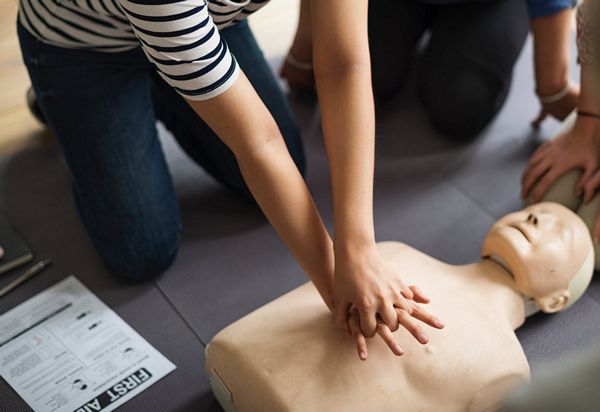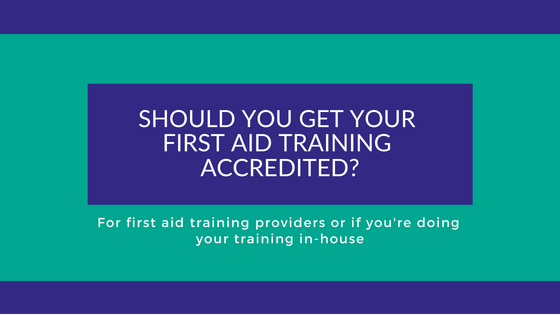Ever since the HSE deregulated (in a manner of speaking) the first aid training market, the number of providers has increased and differentiation has become more difficult. Awarding bodies and accreditation bodies often pitch themselves to first aid training providers as being to help them overcome the competition. But what’s really the case for accreditation? You may find the below useful if you’re a training provider wondering whether to get your first aid courses accredited, or if you’re a consumer looking to see if it’s worth paying the additional cost.
The story so far
In the past, the Health and Safety Executive (HSE) approved first aid training providers. Although the title of the course changed over the years (from Appointed Persons First Aid to First Aid at Work, for example), the importance of the HSE’s stamp of approval was a constant and ensured a quality standard in the market.
After 1 October 2013, however, the HSE ceased approving first aid training providers. The argument from the HSE and the government at the time was to allow organisations more flexibility, but it was also part of a wider shift in regulatory practice of moving the onus on to the organisation itself. It is now the responsibility of organisations to ensure that the training they have received is sufficient and proportionate according to their own risk assessment.
The situation now
The HSE no longer approves first aid training providers. Instead, it has criteria that it recommends organisations look for when choosing a provider. The criteria includes:
- That the trainer has an appropriate qualification
- An organisational quality assurance scheme to monitor training delivery
- Able to produce accurate certificates
- Appropriate course content
Technically, there is nothing that forces organisations to adopt this guidance. The issue only emerges when there is an inspection by either local enforcement agencies or the HSE itself and the organisation must demonstrate that the training is appropriate. However, the number of proactive visits carried out by such bodies has plunged by nearly 70% since 2010, meaning most inspections only occur after an accident or complaint. There are a good number of organisations who are happy to play the percentages.

Why get your first aid training accredited?
So, in that context, why should first aid training providers seek to deliver a regulated qualification or seek accreditation?
1. Rising above the competition
Deregulation meant that the number of smaller training providers increased. Plimsoll has consistently said that the market is either stagnant or growing by very small amounts, but this is only half the story. Plimsoll only looks at the sales revenue of registered companies. The reason that the sales of those companies is falling or flat, however, is because of the large number of sole traders and unregistered providers who have begun to offer their services. This may explain why, in the detail of their report, you will see that the very small – insurgents with little overhead – and very big providers – with recognised brands and marketing power – are growing, whilst the middle-ranking providers are being squeezed.
In other words, first aid training has effectively become commoditised, meaning differentiation has become more and more important. Demonstrating that your courses are of a high standard that you are a reputable provider could be the difference between sales growth or slow decline.
2. Making clients’ lives easier
Although some organisations will seek shortcuts, many will want to ensure that their staff are trained to suitable standards. A small business owner reading the HSE’s criteria may therefore panic about checking that their chosen providers meets all of the best practice checklist.
An accreditation scheme helps make their life easier. If your training is accredited, it gives comfort to prospective clients and makes choosing you as their provider just that little bit easier.
3. The HSE criteria
Unfortunately, incidents do occur and the HSE or other bodies do have to investigate. In those scenarios, the business will need to demonstrate that it chose its first aid training provider in good faith, and the provider will need to show that its product is fit for purpose.
The easiest way to do this is to meet the HSE’s own criteria, which recognises that some providers “operate under voluntary accreditation schemes (including trade/industry bodies)”. Accreditation of your first aid training will help with all the HSE’s criteria, but there are two elements of their checklist that it can particularly help with.
- Is there a quality assurance system in place to monitor the quality of training? Many organisations will be too small and too busy to spend vast amounts of time preparing quality policies and carrying out quality visits. An accreditation scheme will either provide that system for you, or help you to put yours in place.
- Is first aid taught in accordance with currently accepted first-aid practice? Staying up to date with the guidance issued by bodies such as the HSE and Resuscitation Council UK can be difficult, particularly if you’re working in a market this competitive. Accreditation schemes such as Advantage typically offer some form of curriculum update service where they update you on the latest changes in best practice or regulation.
4. In-house training
The HSE criteria has a specific section for organisations carrying out in-house training, although in reality the requirements are similar to those expected of external providers. The challenge is record-keeping. Accreditation schemes may help you with keeping those records. Advantage, for example, offers an online accreditation portal to manage training and qualification records. We also help centres to put internal record systems in place, including checking their in-house trainers’ qualifications.
Conclusion
Getting your training accredited does not make you a great first aid training provider, nor does it prevent you from serious reputation damage if it is found that you cannot back up what you say. It may, however, help steer you in the right direction and show that you take training standards seriously an increasingly difficult marketplace.


